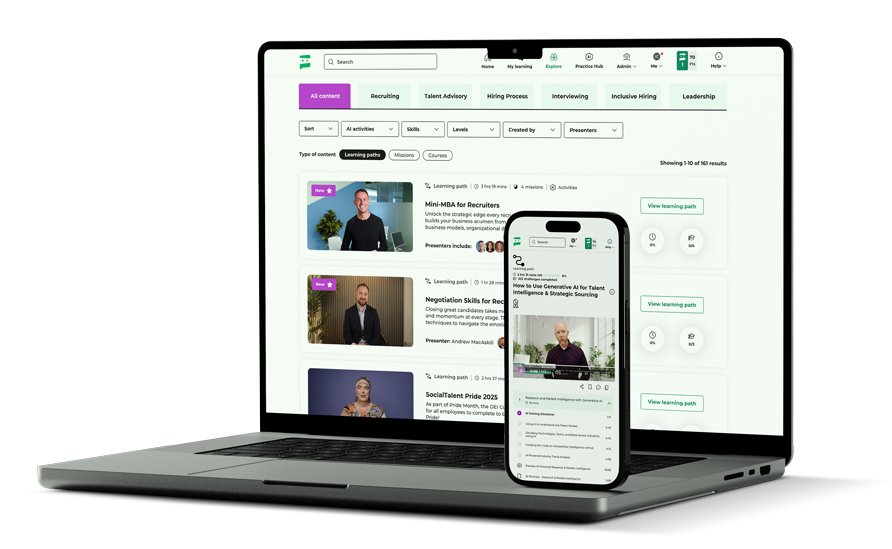
By David Deady
Artificial intelligence (AI) has become a powerful tool not just for companies looking to optimize, but also for job candidates. As this new era of tech continues to transform various industries, its integration into the hiring process presents new opportunities and challenges for both job seekers and recruiters alike.
And while we have all mostly evangelized how AI is revolutionizing hiring for recruiters, the discourse surrounding the other side of the coin has been decidedly muddled and contentious. AI is being widely encouraged for one demographic, but met with scepticism when candidates are looking to use it for a leg up in proceedings. Is it ethical? Is it fair? Or should these applicants actually be commended for using additional resources to improve their chances?
There is so much to consider, and that’s exactly what we’re going to do today! This article will explore how candidates are using AI to enhance their job applications and interviews, and what this means for recruiters tasked with finding the right talent.

The Rise of AI in Job Applications
AI’s impact on the hiring process is multifaceted. For job seekers, AI offers tools that can optimize their resumes, tailor cover letters, and even simulate interview environments. These tools enable candidates to present themselves in the best possible light, increasing their chances of landing an interview.
Resume and Cover Letter Optimization:
Tools like Jobscan, Zety, and ResyMatch have become popular among candidates who want to enhance their application materials. These AI-driven platforms analyze job descriptions and help candidates align their resumes with the specific requirements of the role. By identifying and emphasizing relevant keywords, candidates can increase their chances of passing through applicant tracking systems (ATS) that many companies use to screen applications. This not only saves time but also ensures that their application stands out in a crowded job market.
AI-Generated Content:
Candidates are also using AI to write or refine their cover letters. These tools can generate personalized content based on the job description and the candidate’s experience, making the application more relevant to the employer. While this approach showcases a candidate’s ability to leverage technology, a skill that is increasingly valued in many industries, it also raises concerns about the authenticity of the content, as recruiters may wonder whether they are evaluating the candidate’s true voice and qualifications.
AI in Interview Preparation
AI’s role doesn’t stop at the application stage; it extends into interview preparation as well. With the help of AI-driven tools, candidates can practice their responses, receive feedback on their performance, and even anticipate potential interview questions.
Mock Interviews and Coaching:
Platforms like Interviewing.io offer candidates the opportunity to participate in mock interviews that mimic real-world scenarios. These tools provide instant feedback on various aspects of the interview, such as delivery, pacing, and word choice. This allows candidates to refine their answers and improve their overall performance before facing a real interviewer.
Real-Time Feedback and Anticipation of Questions:
AI-powered interview assistants can offer real-time suggestions and feedback during practice sessions, helping candidates adjust their answers on the spot. Additionally, tools like Google’s Interview Warmup and LinkedIn’s AI feedback feature help candidates anticipate questions that are likely to come up based on the job description. This targeted preparation can give candidates a significant edge, making them more confident and composed during the actual interview.
Analyzing Nonverbal Cues:
Some advanced AI tools can even analyze candidates’ body language and speech patterns during practice interviews. This helps candidates become more aware of how they present themselves and make adjustments to improve their nonverbal communication, which is crucial in making a positive impression on interviewers.
The Ethical Implications for Recruiters
While AI offers numerous benefits for candidates, it also presents ethical challenges for recruiters. As candidates increasingly rely on AI to enhance their applications and interview performance, recruiters must navigate new complexities in assessing the authenticity of a candidate’s qualifications.
Everything we’ve covered so far feels like fair game to a certain extent. It’s about candidates using AI to optimize their strengths and practice. But the needle can turn in the other direction quite quickly too, and if recruiters don’t calibrate how they hire, candidates will leverage AI in ways that could potentially deceive or undermine processes in place.
Balance Recruitment wrote an eye-opening piece about this recently, showing how there are real-time AI assistance tools that can be activated during interviews to prompt answers for candidates. And there’s even bots that will automate applications, citing one called ‘Lazy Apply’ that offers a plan to send as much as 750 tailored CVs a day!
As each day goes by and as technology continues to perfect, it’s becoming an increasingly difficult situation for recruiters looking to gauge a candidate’s true capabilities. As The National CIO Review states:
“[AI] blurs the lines between fair use and undue advantage, urging the tech industry to address these challenges directly. It highlights the necessity for a balanced approach that capitalizes on AI’s benefits while preserving the recruitment process’s integrity.”
And not to mention the inequity this could spell for the hiring process. Not all candidates have access to advanced AI tools, which can create disparities based on economic or technological resources. Candidates who can afford them, or have the advanced technical know-how, may have an unfair advantage over those who do not. This could result in a hiring process that favors candidates with access to these resources, rather than those with the most relevant skills or experience.
Learn more: The Ethical Considerations of AI in Hiring
The Corporate Paradox
As we mentioned earlier, while candidates are using AI to navigate the hiring process, companies themselves are increasingly relying on AI for efficiency and management of large applicant pools. AI is being used in early-stage screening, AI-driven interviews, and even in the decision-making process regarding which candidates to advance to the next stage.
This creates a paradox where companies, while wary of candidates’ use of AI, are also dependent on AI to streamline their hiring processes. The key challenge for recruiters is to strike a balance between leveraging AI to improve efficiency and ensuring that the process remains fair and transparent for all candidates.
During a recent SocialTalent Live event, one of our panelists, Norma Taylor-Ladousse from L’Oréal, opened up about the need for knowledge and balance on both sides of this discussion:
Navigating the Future of AI in Hiring
As AI continues to permeate the hiring process, both candidates and recruiters must adapt to the new landscape. For candidates, AI offers powerful tools to enhance their job search, but it also requires careful consideration of ethical implications and the need to maintain authenticity. For recruiters, the challenge lies in distinguishing genuine talent from AI-assisted enhancements and ensuring that the hiring process remains equitable and transparent.
According to a poll on LinkedIn, 76% of senior recruiting leaders said that they would not think less of job seekers who use AI to enhance their application materials. But the guiding edict should be that you don’t misrepresent yourself. Ultimately, the integration of AI into the hiring process is a double-edged sword. While it offers opportunities for increased efficiency and better candidate-job matches, it also introduces new challenges that require careful navigation. As the use of AI in recruitment continues to evolve, both candidates and recruiters will need to develop new strategies to harness its benefits while mitigating its risks.




